The Tar Heel State's Trusted Dredging Specialists
Professional Dredging for Tidal, Lake & Private Waterways in Asheville, North Carolina
In Asheville, whether along the coast or in the mountains, we handle unique environmental conditions—from tidal creeks and storm surge sediment in coastal waterways to steep-bank access and cove shallowing in mountain lakes like Lake Lure or Fontana. Our services restore navigation, depth, and water quality for ICW-connected properties, marsh channels, and high-elevation retreats.
Why Choose Us for Asheville Dredging Projects?
Specialized expertise in coastal and mountain waterway challenges
-
🌊 Tidal & Intracoastal Waterway Dredging Experience
Support for marsh channels, tidal creeks, and private waterfront access in Asheville's coastal environments, ensuring safe navigation and sediment control in brackish and estuarine areas.
-
🌪️ Storm & Hurricane Sediment Restoration
Recovery from storm surge, washed-in sand, silt, debris, and marsh material after tropical storms impacting Asheville's coastal properties and waterways.
-
⚓ Navigation & Waterfront Access Improvement
Restoring boat access to docks, canals, and creek-fed entrances for Asheville's coastal and inner banks residents, enhancing usability and property value.
-
🏔️ Mountain Lake & Coves Expertise
Skilled in restoring depth in tight coves and steep shoreline environments around Asheville's mountain lakes, addressing sediment pockets and limited access challenges.
-
💧 Water Quality & Sediment Removal for Mountain Lakes
Improve clarity, shoreline usability, and habitat in Asheville's high-country lake environments through targeted dredging and environmental compliance.
-
📋 Permitting Support for Coastal & Mountain Waterways
Guidance with USACE, CAMA, wetlands, and environmental compliance tailored to Asheville's unique coastal or mountainous regulations and conditions.
Expert Lake Dredging & Water Quality Services in Asheville, North Carolina
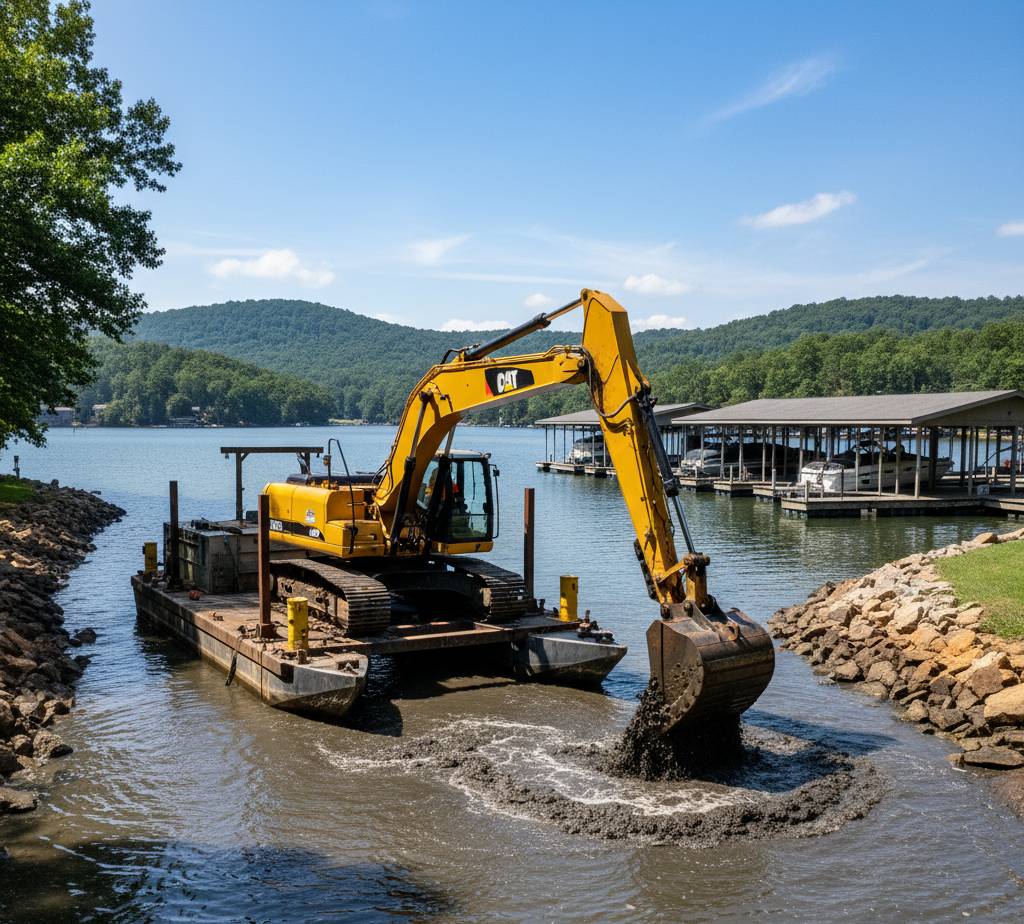
Professional Mechanical Dredging
Lake Norman dock/channel cutting, mountain cove excavation (Fontana/Nantahala), tight HOA access in Wake/Union counties—ideal for near-shore silt removal, muck removal, and targeted lake desilting at docks, ramps, and tight coves across North Carolina.
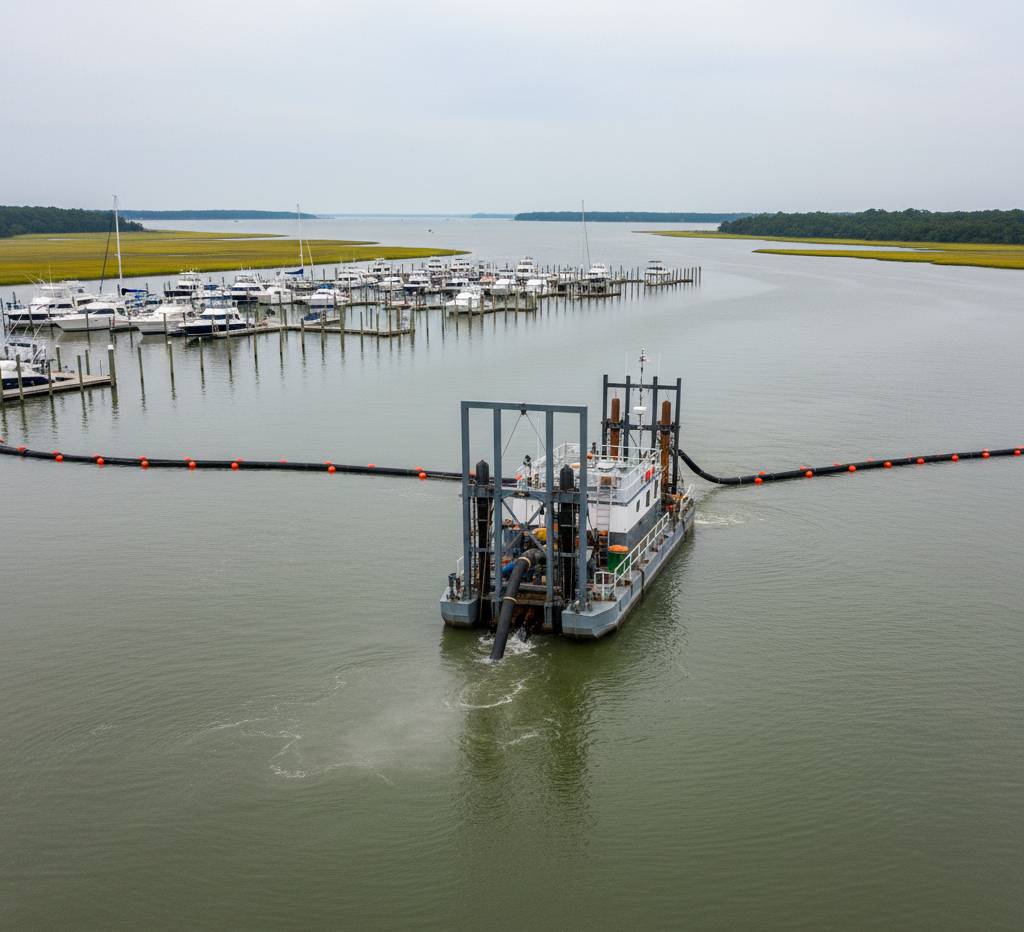
Hydraulic Sediment Removal
Large footprint marinas (Wilmington ICW side canals, New Bern on the Neuse/Trent), fine silt removal (Falls Lake tributary deltas, Tar–Pamlico)—continuous pumping out sediment for longer reaches and sensitive frontage in North Carolina lakes.
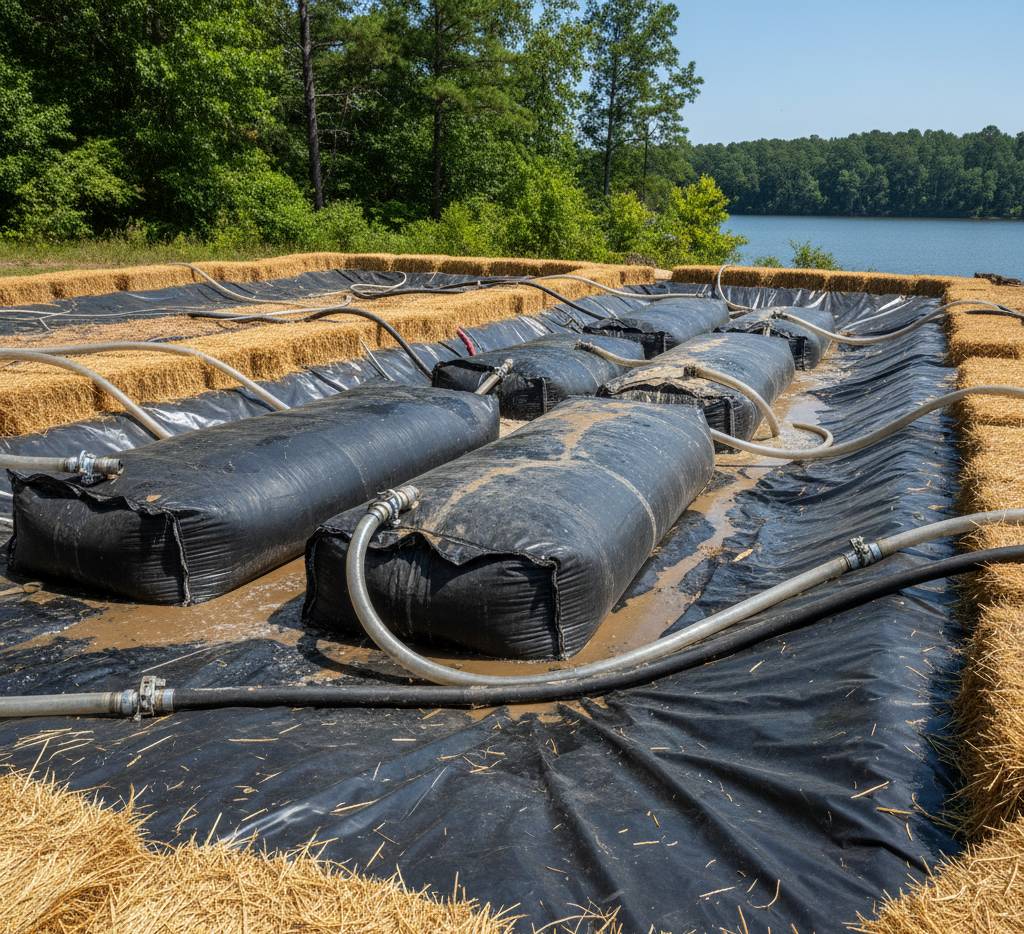
Comprehensive Sediment Management
Volume targets, dewatering pads/geotubes, beneficial reuse (berms/shoreline backfill), disposal logistics by basin (Neuse nutrient rules awareness)—full-cycle sediment management for North Carolina properties, aligning method to budget while maintaining NCDEQ compliance.
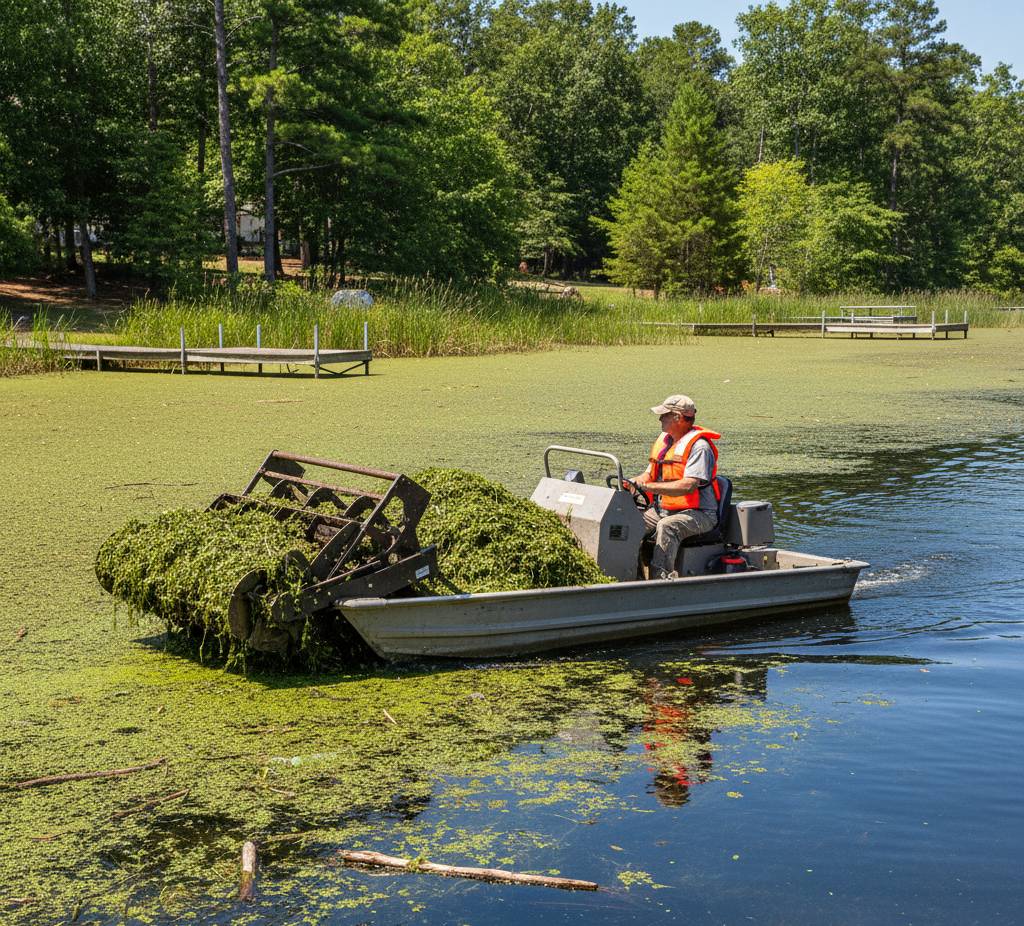
Aquatic Vegetation Management
Duckweed, watermeal, filamentous algae; regionally relevant invasives: hydrilla (noted in Norman/James/Coastal backwaters), alligator weed (coastal plain), elodea/eurasian watermilfoil presence in parts of NC—targeted removal to protect gains after lake dredging.
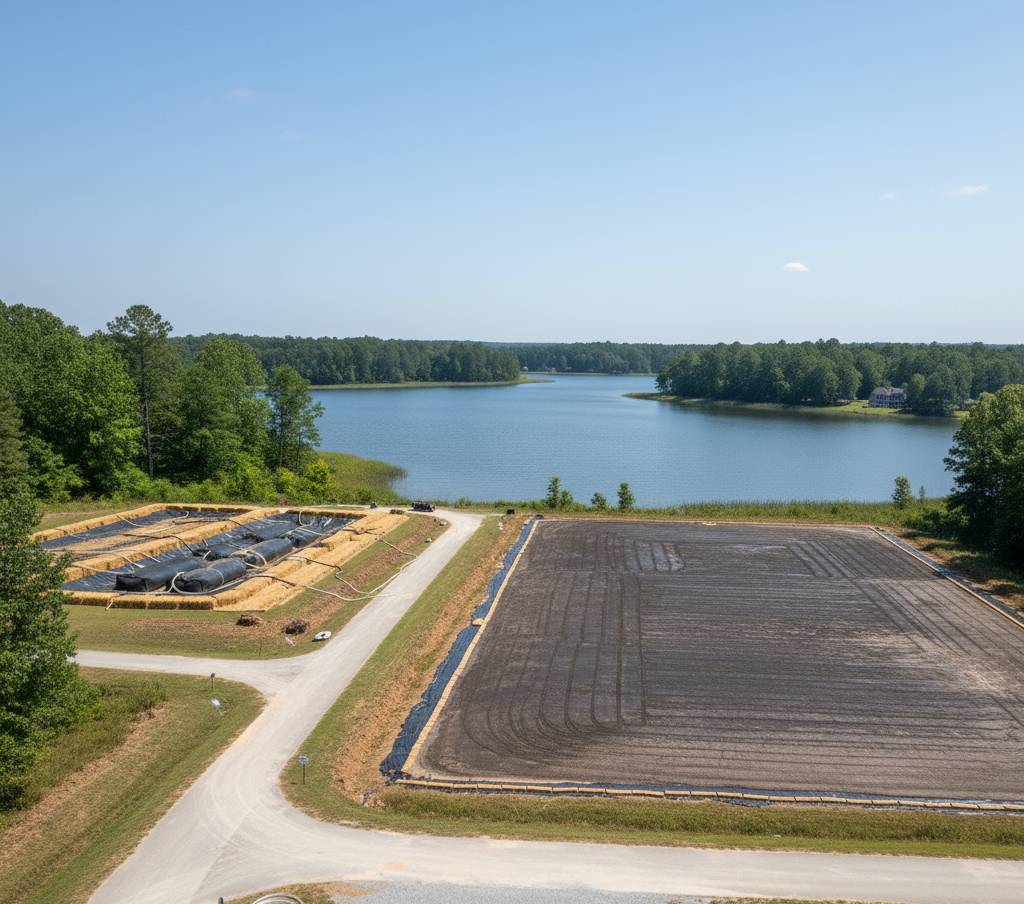
Sediment Dewatering Solutions
Geotextile tube fields in piedmont subdivisions; pad drying where space allows (High Rock/Tillery farm edges)—right-sized dewatering approaches for North Carolina sites that keep sludge removal, desilting, and export efficient.
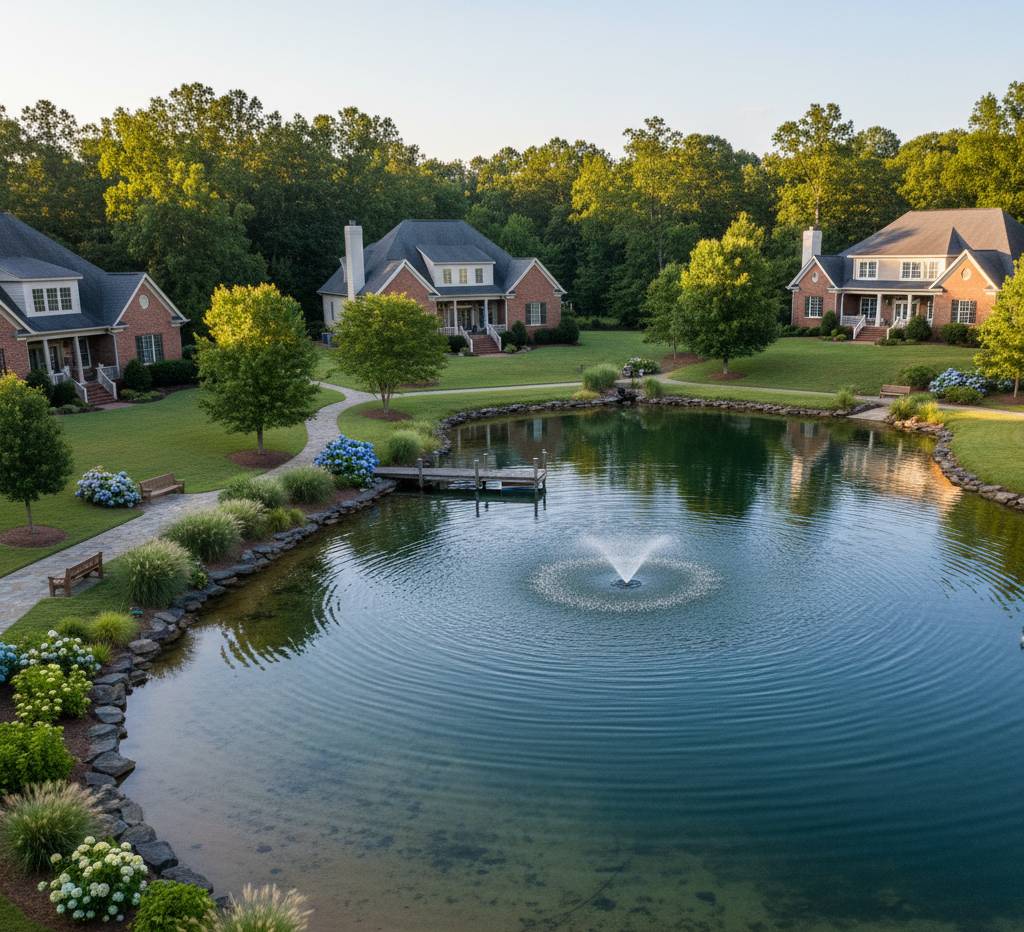
Continuous Lake Management
Inlet delta knockdowns after storm seasons; aeration/circulation on cul-de-sac coves; HOA seasonal checks—post-project lake maintenance for North Carolina properties, including hurricane/tropical rainfall recovery.
Ready to Restore Your Asheville Waterway or Lake?
From coastal tidal creeks to mountain coves, revive your Asheville property for navigation, clarity, and enjoyment—remove storm sediment, restore access, and improve water quality with specialized dredging tailored to coastal or high-country conditions.
FAQ
Frequently Asked Questions About Dredging in Asheville, North Carolina
Can you dredge tidal creeks, canals, or ICW-connected waterways near Asheville?
Yes, we specialize in coastal dredging for tidal influences, marsh channels, and Intracoastal Waterway access around Asheville, using methods that handle brackish water and environmental sensitivities.
Do I need permits to dredge coastal waterways in Asheville?
Permits are often required for coastal work in Asheville, including USACE approvals and potential CAMA involvement—we provide full guidance to ensure compliance with local and federal regulations.
Can dredging help after hurricanes or tropical storms affect my waterfront in Asheville?
Absolutely—our storm recovery dredging removes surge-deposited sand, silt, and debris from Asheville's coastal properties, restoring access and preventing long-term waterway degradation.
How does dredging improve boat access for coastal properties in Asheville?
Dredging clears sediment from channels, creeks, and docks in Asheville, enhancing navigation, boat launches, and waterfront usability while maintaining estuarine health.
Can you dredge coves or steep-shoreline lakefront properties in Asheville?
Yes, for Asheville's mountain areas, we use specialized equipment for steep slopes, tight coves, and limited access, restoring depth without disrupting scenic shorelines.
What access is required for dredging mountain lakes near Asheville?
We adapt to elevation challenges and restricted lots in Asheville's high country, requiring only shoreline staging and basic site evaluation for safe, low-impact operations.
Will dredging help with water clarity, shoreline usability, and depth in Asheville lakes?
Dredging in Asheville's mountain or coastal lakes removes organic buildup and sediment, improving clarity, habitat, and recreational access for boating, fishing, and shoreline enjoyment.
Serving North Carolina Lakes & Communities
We provide dedicated dredging services across North Carolina's major population centers, Duke Energy lakes, and private lakes from Charlotte to Wilmington.
Charlotte Metro & Union
Lake Norman + Lake Wylie + HOA lakes + rapid suburban growth sediment issues—all share similar lake systems (Catawba chain + foothill lakes), red clay runoff issues, and Duke Energy lake management rules.
Lake Norman & Foothills (I-77 / I-85 Belt)
Marina/shoreline + older lake houses on Catawba chain—speaking “Catawba chain” for urban/HOA vs marina/shoreline, with red clay runoff and Duke Energy rules.
Triangle Core (Raleigh–Durham–Chapel Hill & Wake/Johnston)
Suburban HOA lake clusters, stormwater-fed ponds, Neuse basin rules—same stormwater + HOA pond problem profile, same permitting & Neuse watershed nutrient context for Jordan/Falls/Harris narrative.
Triad & Northern Piedmont
High Rock/Badin/Tillery/Belews lake systems, older lakefront infrastructure, sediment from farmland + feeder streams—these lakes operate like one cultural & waterflow region with Yadkin–Pee Dee governing dredging, plus Triad suburbs share HOA lake/pond issues.
Inner Banks & Coastal Plain (Tar–Pamlico / Neuse)
Tar–Pamlico/Neuse sediment and low-slope dewatering talking points—coastal plain fine silt, tidal influences, and nutrient rules awareness.
Cape Fear & Crystal Coast and High Country
“Edge territories” — outside the Piedmont, special-case dredging (tidal or steep access)—coastal/tidal bids + storm sediment + marsh; mountains = steep grade + tight coves + limited lake access (aim “steep access, narrow coves, mountain spoils”).
Inquire about availability for special projects outside these core North Carolina areas (including neighboring states in the Southeast).